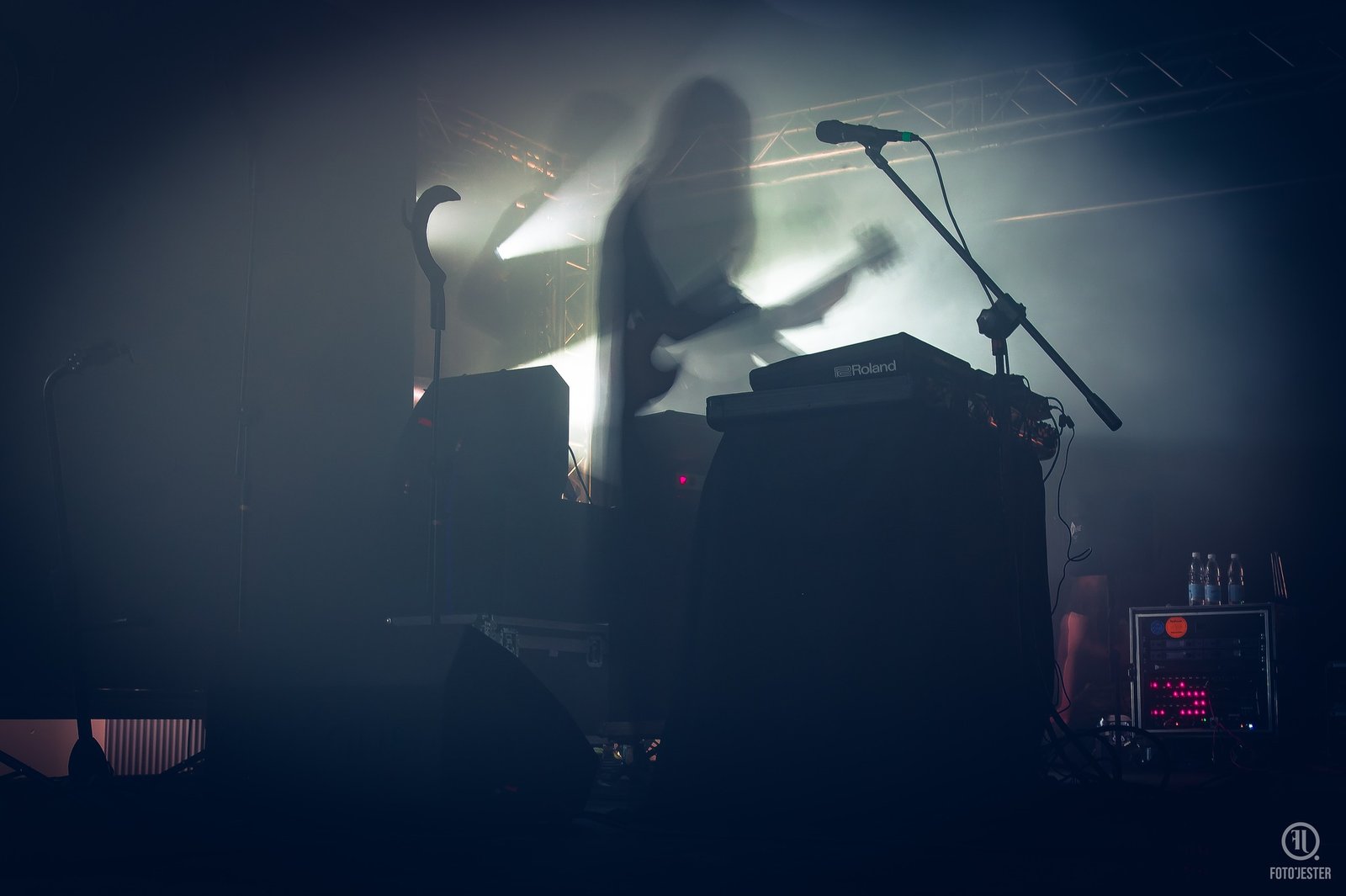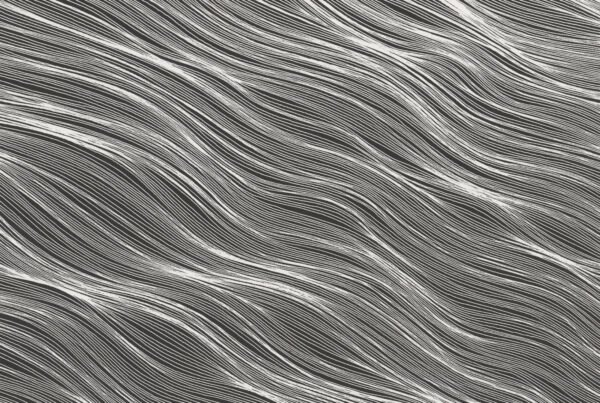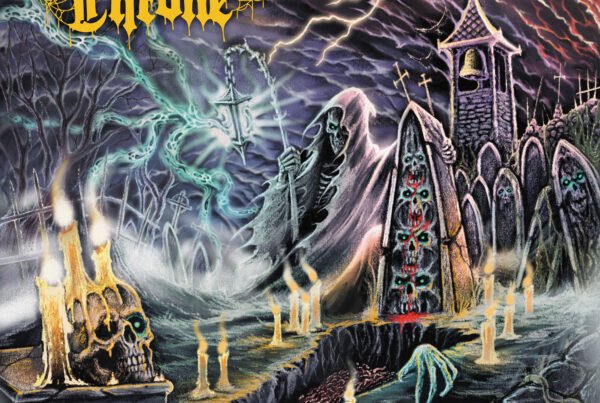Mütterlein‘s new album, Amidst the Flames, May Our Organs Resound, is a harrowing depiction of pain, but also resilience – rooted in history.
Release date: May 9, 2025 | Debemur Morti Productions | Bandcamp | Facebook
It’s the end of autumn in the Southern hemisphere, and, even though I love this season, on some days, it feels like the chill is spreading to my bones; a lack of warmth that is only partially caused by the weather. 2025 is almost halfway over, and it’s been one of the hardest years if my life so far. There have been too many funerals, too much heartbreak, too much work stress, too many bad days – too much everything. And the worst part is, half of that stuff hasn’t even happened to me – I’m experiencing second-hand grief, vicarious heartbreak, derived anxiety. One distraction that has helped me through the neverending slog of days is that I’ve heard some great new music come out of 2025 (and some that’s been…less than impressive, but is still fun to form opinions about). I haven’t reviewed much, but that doesn’t mean I haven’t been listening.
The album I’m writing about today makes everything I’ve experienced this year seem like a walk in the park, and it’s heavy – and I don’t mean blast beats, chugs, plughole growls kind of heavy. I really don’t know where to start with it; I guess, let me introduce the artist: Mütterlein, the creation of the French multi-instrumentalist Marion Leclercq. Mütterlein is a German word that translates to ‘little mother’, or even ‘mother dearest’, and yet there isn’t a lot of maternal warmth in their new album, Amidst the Flames, May Our Organs Resound. It’s shatteringly bleak, furious beyond fury, desperate, grim – I really love the juxtaposition between this image of a wholesome, supportive, nourishing mother, and the rage and pain embodied in this release. I’m not a parent myself and don’t believe I ever will be, but I have it on good authority that parenthood, for all its joys, comes with its fair share of doubt, fear, and misery.
This was actually also a springboard for Amidst the Flames, which was written as a tribute to and in recognition of the appalling medical experiments performed on Anarcha Westcott, a young, enslaved Black woman, in the mid-1800s. Even though the operations performed on Anarcha revolutionised the field of gynaecology, they were done without proper anaesthetic, a ‘luxury’ reserved, at the time, for white women. Anarcha underwent over 30 procedures without her consent, with only opium as sedation or no pain relief at all, often with an audience of observing doctors, and she was not the only enslaved Black woman to undergo operations like this. Mütterlein explores the depths of pain Anarcha and others in her position must’ve gone through, and yet, Amidst the Flames is also a testament to resilience – Anarcha’s wounds, caused by a traumatic stillbirth, were eventually successfully treated, and she went on to live for another several decades.
Reading about Anarcha and other women who underwent similarly atrocious procedures (such as Lucy and Betsey, and many whose names we will never know) really fascinated me, and highlighted to me how little I know about the origins of modern medicine and the lives of Black people during the time when slavery was prevalent. In fact, this review took me so long to write because I wanted to do their stories justice – which I feel I am failing to do. I was supposed to be writing this review one evening, and got completely sidetracked by trying to find J.C. Hallman’s book, Say Anarcha, which is one of the most widely recognised and most extensively researched accounts of Anarcha’s life, and her lasting legacy. Surprisingly difficult to find in little old New Zealand, but I’ll get my hands on it somehow. So I do apologise that my knowledge regarding exactly what happened in Anarcha’s life is frustratingly surface-level.
Anyway – Anarcha Westcott’s abhorrent experiences as a non-consenting subject in extensive, invasive, semi-public, and incredibly painful medical experiments is the basis for Mütterlein’s incredible new album. It’s one of those albums that demands to be not just listened to, but heard; to be perceived, understood, and felt. To me, I find it hard to imagine anyone could listen to this album and not be moved, not feel the bleak darkness. I have a little bit of synaesthesia, and I seriously don’t believe I’ve ever heard an album this starkly black-and-grey. Let’s get into it.
Amidst the Flames opens with an almost meditative intro track, simply called “Anarcha”. There’s a foreboding, brooding quality to the song, which consists almost entirely of throbbing and swelling synths, and snare hits like whip lashes. Already, we’re plunged into a world that’s so dark, so visceral, and somehow timeless; there’s an almost droney element to it that seems ritualistic and arcane, and yet, there don’t seem to be any traditional (as in, non-synthesised) instruments used. The track segues seamlessly into “Concrete Black”, which builds anxiously through bending synths and rhythmic bell hits into a shuddering bleakness of distortion and drums. Ghostly choral pads create a chilling atmosphere of both reverence and death. We get to hear Leclercq’s vocals for the first time – harsh, smoky, almost brittle, and yet incredibly beautiful – as well as these beautiful, tremolo-picked guitar lines. The whole song is dark, terrifying, and yet gorgeous; and it ends with choirs and organ, like a requiem, and a kick drum like a heart desperate to stop beating. Eventually, the instruments detune into total blackness.
In contrast to the damning darkness of “Concrete Black”, “Wounded Grace” is pure anxiety and torture. It drives forward mercilessly, an intense pain becoming ever sharper and darker, the vocals husky, clean, simple, and defeated. I really adore the expression in Leclercq’s voice; there’s something incredibly visceral about the way her throat just sometimes seems to give out, and yet she pushes through to finish the line; something beautiful about how fragile and yet how determinedly she delivers the lines. Her singing gives way to a lovely melodic guitar line, suspended over the bed of jagged, distorted rhythms and uncompromising drums. The song seems like a threat, and also, a resigned endurance of pain. It ends ethereally, a loss of consciousness, falling into a fitful dream, with only a dull recognition of the surrounding world.
“Memorial One” offers a slight respite, yet it’s not restful, filled with throbbing synths and rattling percussion, like blood pounding in your ears. The tones are didgeridoo-like, the whole atmosphere arcane and almost sacred; the addition of a church organ adds to this vibe, but is it a prayer, or damnation? From the haze of “Memorial One”, Mütterlein shift gears completely into “Division of Pain”, easily the most black metal song on Amidst the Flames, and yet too complex to be reduced to any one genre. A meditative, meandering, clean guitar line heralds the end of this song, and the start of a fresh new hell: “Ivory Claws”.
This track is probably the most intricate song on the album. I hear something new in it every time; its backbone, at least at the start, is a simple kick drum pattern and an industrial, deadened closed hi hat, a rhythmic grounding for Leclercq’s heavily distorted vocals and the wavering synth layers. Gradually, more and more percussion elements enter, along with a spectral, pulsating ghost synth on the left, until there is a mattress of mostly pitch-less sound. A distant, twinkling melody hangs suspended like mist, and is gone all too soon. The whole song peels back to its skeleton, leaving only a few rhythmic elements, a clock ticking, before a dramatic shift into something choppy, desperate, and alive. The kick drum is no longer soft and round, but incessantly thudding, chopping up all in its path. Leclercq’s vocals are more harrowing than ever, filled with a desperate desire to be heard, all grit and smoke and layers of ghostly clarity. ‘The unwanted child, the unloving mother, I am every monster/Everything they despise, and I seek no disguise… I am a requiem woven from scars and grace/Tracing my path through the ages, seeking my place.’
The album ends with shocking simplicity on “Memorial Two”, constructed of drones, swells, sparce percussion, and a repeated line: ‘Let the curse fall on me’. A truly haunting way to end an incredibly intense and heavy experience.
I’m not really sure what I can say about Amidst the Flames that will actually do it justice. I’m incredibly moved by it, and have been obsessing over it since I first heard it a little over a week ago. It’s one of those releases that feels like so much more than just music. It’s a monument, a tribute, an outpouring. It doesn’t just deserve to be heard – it demands it.






